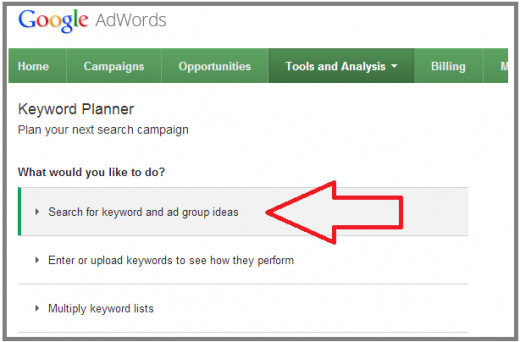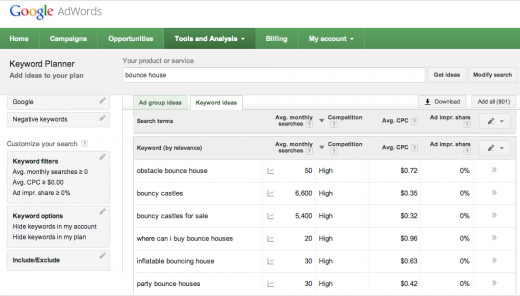Get Panda Lost Traffic Back with Easy Keyword Tricks : Beginners SEO Guide

Keywords-Your Key to Generate Traffic
If you are a content writer or an internet entrepreneur, then you might have come across the term ‘Keywords’ many times.
According to Wikipedia “Keywords are the words that academics use to reveal the internal structure of an author's reasoning. While they are used primarily for rhetoric, they are also used in a strictly grammatical sense for structural composition, reasoning, and comprehension. “ Doesn't make any sense.
For us, writers, keywords are a way to drive traffic to our blogs, websites or other business niches.
So..What are these keywords?
When people look for information online, they usually start with search engines. Typing a series of words that fit with what they are looking for. Statistics show that there are some combinations of words that are used more frequently than others. These combinations become the key words. What you really want is to build or modify your site so that they appear as the appropriate response to those keywords.
While there are numerous keywords and many more companies trying to use the same, you have to find your specific niche. The best way to do this is to look at those keywords that are popular, but at the same used by a few sites. That is the right strategy to earn one of the top three spots in Google results. You need to be on top because the first three positions in the search results take more than 50% of the traffic.
How to find the right keywords?
-
Understand Your Target Audience
One of the most common mistakes made while making the keywords is believing you already know what kind of words people will use to search.The more knowledge you have in a particular area, it is likely that you use more technical and specific terms. People who actually use the same words you would use may not be exactly your target audience.
To understand what kind of words users will use to find your content, the first step is not to rely on your knowledge of your expertise to put together a list of keywords. Instead, think like a consumer who want your content. What would they type in??
-
Assemble a List of Words
The intention in this step is to assemble a list of potential keywords. If you have a team, great! Ask everyone. Conduct an interview or questionnaire. Otherwise, ask friends and relatives about what kind of words would they use to find content on the subject of your site. Or you can just use keyword research tools.
More 4 U
- How to SEO: 7 Easy Strategies to Optimize Your Blog for Better Ranking in Search Engines
Are you still ignored by Google and other search engines? Do you want higher rankings and traffic? Fear not. Read on and you will find out the tricks. Search engine optimisation made easy. - 24 SEO Tips and Tricks That Will Get You Top Ranked in 2014
This article provides a summary of the most effective search engine optimisation tips and strategies for your website to rank high on Google. These 24 SEO Tips will solve 90 % of your SEO headache.
Google Keyword Planner
Google has a large database of keywords and the traffic associated with these which is called "Google Keyword Planner." This tool will tell you how many monthly searches your keywords get globally or locally. Also shows the CPC and Competition of each keyword.


- Check out the competition: you really need to choose your keywords where the competition is low to move up quickly in Google results. Select a keyword from the keyword short list you made from Keyword Planner and search it on Google. Examine the top 5 sites in the search results of Google. Check their PR and their inbound links (backlinks) using SEO Quake. Repeat the entire process for each keyword.
The keywords with no use are those who return to sites like Wikipedia and others with a Page Rank greater than 4. The easiest ones are those who return on sites like Yahoo Answers. Sites with PR 2 or less.
- Finding variations: Keyword Planner also gives many suggestions for your keyword. Look it up and select suitably.
- The objective of the keyword: Many people think that the articles contain lots of keywords are those that reach a higher score. This is not true.If you add too many keywords in your articles, the search engine algorithm will not be able to associate it with any specific keyword. So follow one keyword per article. You can use 4 or 5 variations of the same keyword in order to make your article more readable and increase its score.
Avoid very popular keywords with high competition and with less than 200 monthly searches.
How to use Keyword Planner: Good Tutorial
How to Use Keywords?
After you finish assembling your list of keywords, the next step is to plan how to use keywords on pages.
Each page must focus on only one topic.
If your query is efficient and consistent with the theme of the site, many of these keywords will appear naturally throughout the content. Use this fact to your advantage! Enjoy the natural occurrence of words to set the keywords for each page.
A Systematic Approach
To use the search engine bots to your advantage, we first need to understand what are the levels of keyword.
- First level: Main keyword (content focus).
- Second level: words related to the main keyword.
- Third level: words related to the keyword in the second level.
After you determine which is the first level keyword of a landing page, search for all words related to it.
As an example, Lets consider a site about luxury cars. Say they have many pages describing cars all around the world. Their primary keyword will be cars. Second level keywords will be more specific like Lamborgini Gallardo or yellow car and third level will be long tail keywords like yellow Lamborgini with v8 engine.
Now a days, Long tail keywords are more likely to be indexed. So find as many long tail keywords and include these in the first two paragraphs of your articles.
Organize your keywords
To organize keywords divide them into categories and make a table with the main keyword and secondary keywords.
Example:
In the above example, there are three categories:
- Essential attributes (safety, comfort and design).
- Car parts (engine, steering, banks and exchange).
- Needs (license plate and documentation).
Insert suitable keywords into suitable pages.
Other Useful Tools
Another useful tool is Google suggestions. While searching for something in google, we can see the Google’s auto suggestion. This can be used to find long tail keywords. Clear your cache and cookies. Search for your topic and that’s it.
Google Trends: It shows trends of searches performed by users, which helps us to have ideas of search terms at a certain period of time in different geographical locations. Moreover, it is also possible to identify trends in research in different Google products like YouTube , Google Images, News and even on Google Shopping.
You can also compare search volume between two similar terms.
Google Contextual Targeting Tool: It allows you to discover connections between keywords you have never even imagined. It is one of those tools as AdWord that offer you a complete service for your model portfolio of keywords , but it can be useful to take a look at scenarios that far (maybe) was ignored.
4 Tools to Find Your Competitors Keywords
Competitor Keyword Research
One of the specialties of the internet is that "nothing is created, everything is copied." Find what keywords your competitors are using. Check for their missing keywords that you know. Using them will surely generate more traffic.
10 best Keyword List Generator
Do you follow all these when searching for keyword? Have you used any different methods to do keyword research ? Tell us what you think of this process!












